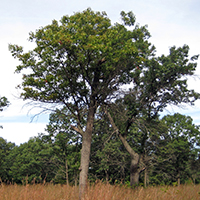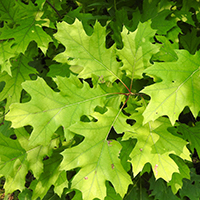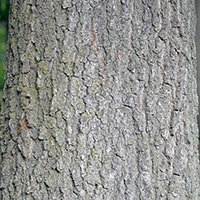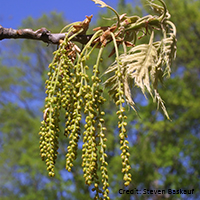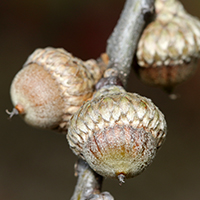What black oak looks like
Size and shape
- Reaches 20 metres high.
- Trunk up to 90 centimetres in diameter.
Leaves
- Shiny green upper above and yellowish below (10 to 20 centimetres long).
- 5 to 7 lobes separated by U-shaped notches.
- Lobes are broader at the tip than at the base.
Bark
- Dark grey and smooth when young.
- Almost black and ridged with age. Ridges are checkered or broken up.
Flowers
- Male flowers grow as small drooping catkins.
- Female flowers grow individually or in small clusters of spiked flowers.
- Flowers bloom as leaves emerge.
Fruit
- Acorns are small (12 to 20 millimetres long).
- Dull brown cup covers about one-half of the nut.
Where black oak is found
Black oak is found in Southern Ontario north of lakes Erie and Ontario.
What you need to know to grow black oak
- Moisture: grows best in well-drained soils.
- Soil: can grow in acidic soils or chalky sand
- Shade: requires full to part sun.
- Cautions:
- Black oak has a long taproot that makes it difficult to transplant.
- Oak wilt is caused by an invasive fungus that has been found in Southern Ontario. To minimize the risk of oak wilt, save pruning for before April and after July, when beetles thought to transport the fungus are less active.
Benefits and uses of black oak
Wildlife benefits
Black oak acorns are a food source for many species, including:
- squirrels
- mice
- white-tailed deer
- raccoons
- wild turkey
Black oak trees are host to butterfly and moth larvae and provide nesting sites for birds. They also develop large cavities that wildlife use for shelter and nests.
Commercial uses
Black oak wood is strong and hard. It’s used to make:
- furniture
- flooring
- veneer
- interior trim
Black oak inner bark contains a yellow pigment called quercitron, which was popular in the 1940s, when it was boiled to create a yellow dye.
Fun facts about black oak
- Black oak trees can live up to 200 years.
- Black oak products were used commercially as early as 1800.
Updated: January 10, 2024
Published: July 18, 2014
